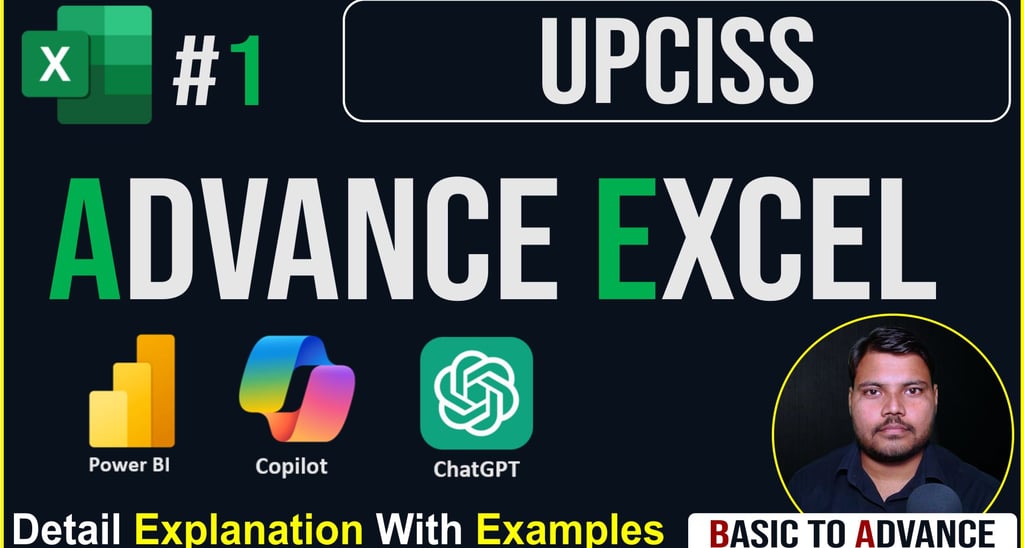Advance Excel Course
An advanced Excel course is a specialized training program designed for individuals who have a foundational understanding of Excel and want to enhance their skills for complex data analysis, reporting, and automation. These courses are highly sought after by professionals in fields such as finance, accounting, business analysis, and data science, as well as job seekers looking to improve their employability.
Syllabus and Curriculum
Key Topics Covered in an Advanced Excel Course
While specific course content may vary, a typical advanced Excel course will cover a range of topics that go beyond basic functions and formulas. You can expect to learn about:
Advanced Formulas and Functions:
Logical Functions: IF, AND, OR, NOT, and nested IF statements.
Lookup Functions: VLOOKUP, HLOOKUP, XLOOKUP, INDEX, and MATCH.
Statistical Functions: SUMIF, COUNTIF, AVERAGEIF, and their "s" counterparts (e.g., SUMIFS).
Text Functions: LEFT, RIGHT, MID, TRIM, CLEAN, CONCATENATE, and TEXTJOIN.
Date and Time Functions: TODAY, NOW, EOMONTH, and NETWORKDAYS.
Dynamic Arrays and Array Formulas: UNIQUE, FILTER, SORT, and other functions that can spill results into a range of cells.
Data Analysis and Visualization:
Pivot Tables and Pivot Charts: Creating, modifying, and analyzing large datasets with PivotTables, including calculated fields and items.
Data Cleaning and Preparation: Techniques like Text to Columns, Remove Duplicates, and using Flash Fill.
Data Validation: Creating dropdown lists and applying validation rules to ensure data accuracy.
Conditional Formatting: Using advanced rules and formulas to highlight and visualize data based on specific conditions.
Advanced Charting: Creating interactive and dynamic charts, including combination charts, sparklines, and using slicers to filter data.
What-If Analysis: Using tools like Goal Seek, Data Tables, and Scenario Manager for financial modeling and forecasting.
Power Query and Power Pivot: Importing, transforming, and modeling data from multiple sources.
Eligibility and Target Audience
Eligibility: While the specific requirements may vary, minimum qualification of 10th or 12th standard.
Target Audience: The course is ideal for students from any stream (Arts, Commerce, Science) who want to gain practical Advance Excel skills. It is also suitable for professionals who wish to upgrade their skills for better job opportunities.
Career Scope
Mastering advanced Excel functions like PivotTables, Power Query, Macros, and complex formulas (e.g., VLOOKUP, INDEX-MATCH) allows you to handle large datasets, automate tasks, and create dynamic reports. This leads to opportunities in roles that are data-driven.
Financial Analyst: You'll use Excel for financial modeling, budgeting, forecasting, and creating complex valuation models to help businesses make strategic investment decisions.
Data Analyst: This is a foundational role. You'll collect, clean, and interpret data to identify trends and provide actionable business insights. Excel, often combined with other tools like Power BI or SQL, is a core part of this job.
Business Analyst: You'll bridge the gap between business needs and IT solutions, using Excel to analyze processes, track performance, and present data-driven recommendations to stakeholders.
Management Information Systems (MIS) Executive: In this role, you're responsible for managing and providing data to different departments. You'll create reports and dashboards to help management monitor key performance indicators (KPIs) and make informed decisions.
Project Manager: Advanced Excel skills are crucial for project managers to track project timelines, allocate resources, manage budgets, and create progress reports.
Contact
jitendra@upciss.in
© 2025. All rights reserved.

